一般将来时与一般现在时——讲解及练习
(完整版)一般将来时、一般现在时、一般过去时、正在进行时练习题
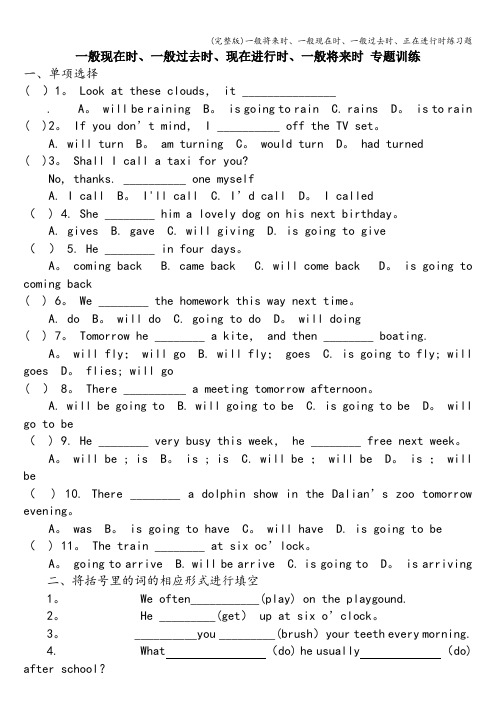
一般现在时、一般过去时、现在进行时、一般将来时专题训练一、单项选择( )1。
Look at these clouds, it _______________. A。
will be raining B。
is going to rain C. rains D。
is to rain ( )2。
If you don’t mind, I __________ off the TV set。
A. will turn B。
am turning C。
would turn D。
had turned( )3。
Shall I call a taxi for you?No, thanks. __________ one myselfA. I call B。
I'll call C. I’d call D。
I called() 4. She ________ him a lovely dog on his next birthday。
A. givesB. gaveC. will givingD. is going to give() 5. He ________ in four days。
A。
coming back B. came back C. will come back D。
is going to coming back( ) 6。
We ________ the homework this way next time。
A. do B。
will do C. going to do D。
will doing( ) 7。
Tomorrow he ________ a kite, and then ________ boating.A。
will fly; will go B. will fly; goes C. is going to fly; will goes D。
flies; will go( ) 8。
初中一般现在时-一般过去时-一般将来时-现在进行时总结练习
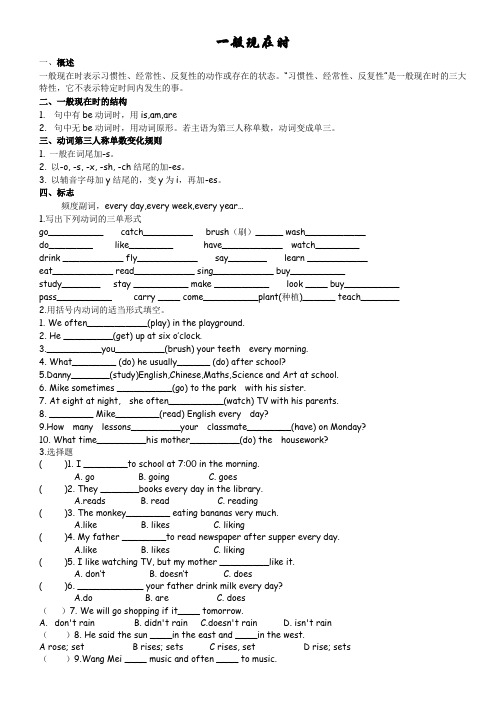
一般现在时一、概述一般现在时表示习惯性、经常性、反复性的动作或存在的状态。
―习惯性、经常性、反复性‖是一般现在时的三大特性,它不表示特定时间内发生的事。
二、一般现在时的结构1.句中有be动词时,用is,am,are2.句中无be动词时,用动词原形。
若主语为第三人称单数,动词变成单三。
三、动词第三人称单数变化规则1. 一般在词尾加-s。
2. 以-o, -s, -x, -sh, -ch结尾的加-es。
3. 以辅音字母加y结尾的,变y为i,再加-es。
四、标志频度副词,every day,every week,every year…1.写出下列动词的三单形式go__________ catch_________ brush(刷)_____ wash___________do________ like________ have___________ watch________drink ___________ fly___________ say_______ learn ___________eat___________ read___________ sing___________ buy__________study_______ stay __________ make __________ look ____ buy__________pass__________ carry ____ come__________plant(种植)______ teach_______2.用括号内动词的适当形式填空。
1. We often___________(play) in the playground.2. He _________(get) up at six o’clock.3.__________you_________(brush) your teeth every morning.4. What________ (do) he usually______ (do) after school?5.Danny_______(study)English,Chinese,Maths,Science and Art at school.6. Mike sometimes __________(go) to the park with his sister.7. At eight at night, she often__________(watch) TV with his parents.8. ________ Mike________(read) English every day?9.How many lessons_________your classmate________(have) on Monday?10. What time_________his mother_________(do) the housework?3.选择题( )1. I ________to school at 7:00 in the morning.A. goB. goingC. goes( )2. They _______books every day in the library.A.readsB. readC. reading( )3. The monkey________ eating bananas very much.A.likeB. likesC. liking( )4. My father ________to read newspaper after supper every day.A.likeB. likesC. liking( )5. I like watching TV, but my mother _________like it.A. don’tB. doesn’tC. does( )6. ____________ your father drink milk every day?A.doB. areC. does()7. We will go shopping if it____ tomorrow.A.don't rainB. didn't rainC.doesn't rainD. isn't rain()8. He said the sun ____in the east and ____in the west.A rose; setB rises; setsC rises, setD rise; sets()9.Wang Mei ____ music and often ____ to music.A like; listenB likes; listensC like; are listeningD liking ; listen()10. Jenny____ English every evening.A has studyB studiesC studyD studied4.改错(划出错误的地方,将正确的写在横线上)1. Is your brother speak English? __________________2. Does he likes going fishing? __________________3. He likes play games after class. __________________4. Mr. Wu teachs us English. __________________5. She don't do her homework on Sundays. _________________5.把下列句子变成一般疑问句(并作肯定和否定回答)、否定句1.My friends like playing soccer.2.They speak English every day.3.Daniel watches TV every evening4.John is from Canada.5.Tom does his homework at home.6.My dog runs fast.7.Amy likes playing computer games.8.She can play the piano well.现在进行时态1.定义:现在进行时表示正在发生或进行的动作。
外研新版 八下 一般现在时、现在进行时、一般过去时、一般将来时、现在完成时。讲解及练习

外研八下5种时态练习【现在完成时】延续性动词与非延续性动词之间的转换:leave --- be away, borrow --- keep, buy --- have, become --- be, begin/start --- be on, go there --- be there, go (get) out →be out,die --- be dead, finish --- be over, open sth --- keep sth open, join ---be in+组织机构/ be a member of+组织机构put on→ wear;fall ill --- be ill, get up---be up, catch a cold --- have a cold, fall asleep --- be asleep, come back --- be back, leave --- be away from, come here --- be here, get to know --- know, catch a cold →have a cold get to/ arrive/reach --- be (in),1. —What‘s wrong with you?—I‘ve ____ a headache.A. getB. gotC. hadD. have2. —Has the doctor _____ your temperature?—Yes, he has.A. doB. takeC. tookD. taken3. Doing much ____ is good for your health.A. foodB. coldC. exerciseD. computer4. —Have you caught a _______?—Yes, I have. I cough now.A. feverB. coldC. toothacheD. cough5.Students in Beijing ______ away many books to the Hope Schools since 2009.A. have givenB. giveC. gave6. He _______ Luzhou for three months.A. has leftB. has come toC. has gone toD. has been away from5. ―Did you borrow the comic book from the library?‖“Yes. I _____ it for three days. I’ll return it this afternoon.”A. borrowedB. keptC. have borrowedD. have kept6. The astronaut is so tired that he ______ for eleven hours.A. has been asleepB. has fallen asleepC. has gone to bedD. has gone to sleep7. When he arrived at the bus stop, the bus _______ for 20 minutes.A. has leftB. had leftC. has been awayD. had been away8. I ______ the League for 5 years so far.A. joinedB. have joinedC. have been in9. The factory ________ since the February of 1988.A . has been open B. has opened C. was open D. opened10. Mary and Rose _______friends since they met in 2000.A. have madeB. have beenC. madeD. have become11.You mustn't ________ until he comes back.A. be awayB. leaveC. be left12.The meeting _______ for a week now.A. has finishedB. has endedC. has been over13.Miss Gao ______ this school for nearly 5 years.A. has been inB. has come toC. has taught14.Ben ______ a teacher for 4 years .A. has beenB. has becomeC. wasD. became15. I ______ home for a week.A. have returnedB. have been backC. returned16. How long _______ he ________ ?A. diedB. has, diedC. has, been dead17. He ______ at eight yesterday afternoon.A. sleptB. was sleepingC. has sleepD. had slept18.He ________ the car for a week.A. boughtB. has boughtC. has had【一般现在时】一般现在时:表示经常性的事情,经常性的动作或一般性事实。
一般将来时、一般现在时、一般过去时、正在进行时练习题
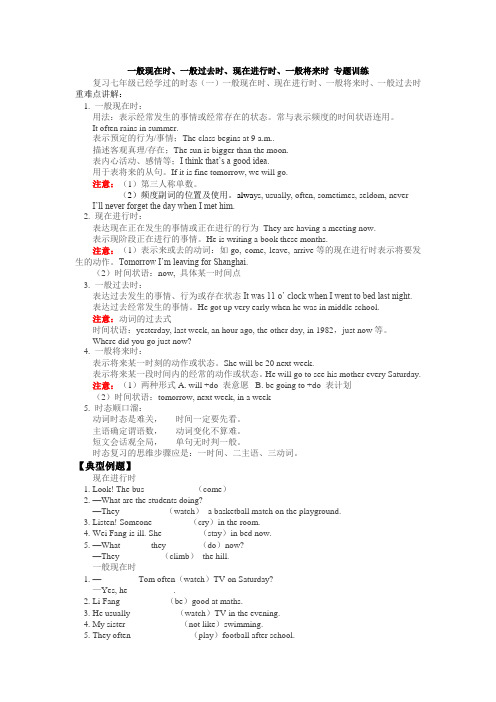
一般现在时、一般过去时、现在进行时、一般将来时专题训练复习七年级已经学过的时态(一)一般现在时、现在进行时、一般将来时、一般过去时重难点讲解:1. 一般现在时:用法:表示经常发生的事情或经常存在的状态。
常与表示频度的时间状语连用。
It often rains in summer.表示预定的行为/事情;The class begins at 9 a.m..描述客观真理/存在;The sun is bigger than the moon.表内心活动、感情等;I think that’s a good idea.用于表将来的从句。
If it is fine tomorrow, we will go.注意:(1)第三人称单数。
(2)频度副词的位置及使用。
alwa ys, usually, often, sometimes, seldom, never I’ll never forget the day when I met him.2. 现在进行时:表达现在正在发生的事情或正在进行的行为They are having a meeting now.表示现阶段正在进行的事情。
He is writing a book these months.注意:(1)表示来或去的动词:如go, come, leave, arrive等的现在进行时表示将要发生的动作。
Tomorrow I’m leaving for Shanghai.(2)时间状语:now, 具体某一时间点3. 一般过去时:表达过去发生的事情、行为或存在状态It was 11 o’ clock when I went to bed last night.表达过去经常发生的事情。
He got up very early when he was in middle school.注意:动词的过去式时间状语:yesterday, last week, an hour ago, the other day, in 1982,just now等。
一般现在时、一般过去时、一般将来时讲义和练习

优业教育学科教师辅导讲义根据括号的要求变换句子:1.Do you often play football after school? (肯定回答)2. I have many books.(改为否定句)3. Gao Shan’s sister likes playing table tennis.(改为否定句)4. She lives in a small town near New York.(改为一般疑问句)5. I watch TV every day.(改为一般疑问句)6. David has got a goal.(改为一般疑问句)7. We have four lessons.(否定句)8. Nancy doesn’t run fast.(肯定句)9. My dog runs fast.( 否定句)【语法练习】选择填空 ( ) 1.A: How often ______ she exercise? B: Twice a week.A. doB. doesC. doingD. did ( ) 2. I ______ like to drink milk. A.not B. doesn’t C. don’t D. no ( ) 3. Good food and exercise ______ me to study bettter.A. helpB. helpsC. helpingD. to help ( ) 4. Is her lifestyle the same ______ yours or different?A. asB. inC. atD. to ( ) 5. I like ____ for breakfast. A. a book B. a ruler C. an egg D. a sofa ( ) 6. The ____are $21. A. glasses B. shoe C. table D. bike ( ) 7. Tennis ____ my favourite sport. A. are B. is C. am D. be ( ) 8. I have a tennis and my friend Jim ____ two tennis rackets.A. haveB. playC. playsD. has ( ) 9. “Let’s play computer games.”“That ____ interesting.”A. looksB. soundsC. listensD. reads ( )10. My father likes football. But he ____ it.【综合能力检测】一.根椐题意和所给的字母提示,填入正确的单词。
一般现在时,一般过去时,一般将来时及现在进行时
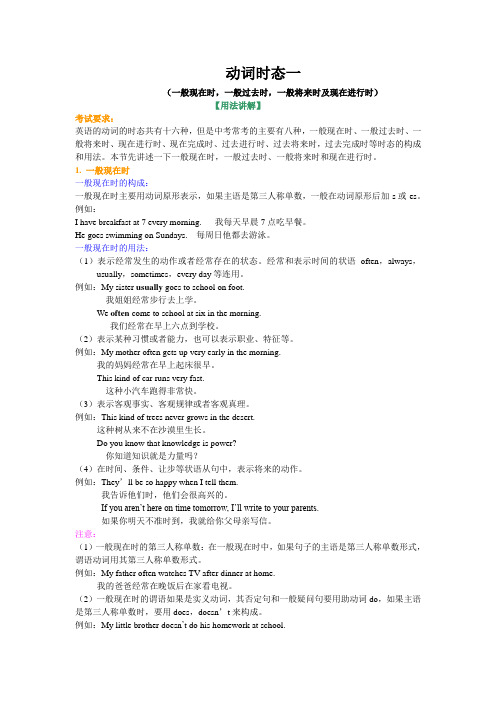
动词时态一(一般现在时,一般过去时,一般将来时及现在进行时)【用法讲解】考试要求:英语的动词的时态共有十六种,但是中考常考的主要有八种,一般现在时、一般过去时、一般将来时、现在进行时、现在完成时、过去进行时、过去将来时,过去完成时等时态的构成和用法。
本节先讲述一下一般现在时,一般过去时、一般将来时和现在进行时。
1. 一般现在时一般现在时的构成:一般现在时主要用动词原形表示,如果主语是第三人称单数,一般在动词原形后加-s或-es。
例如:I have breakfast at 7 every morning. 我每天早晨7点吃早餐。
He goes swimming on Sundays. 每周日他都去游泳。
一般现在时的用法:(1)表示经常发生的动作或者经常存在的状态。
经常和表示时间的状语often,always,usually,sometimes,every day等连用。
例如:My sister usually goes to school on foot.我姐姐经常步行去上学。
We often come to school at six in the morning.我们经常在早上六点到学校。
(2)表示某种习惯或者能力,也可以表示职业、特征等。
例如:My mother often gets up very early in the morning.我的妈妈经常在早上起床很早。
This kind of car runs very fast.这种小汽车跑得非常快。
(3)表示客观事实、客观规律或者客观真理。
例如:This kind of trees never grows in the desert.这种树从来不在沙漠里生长。
Do you know that knowledge is power?你知道知识就是力量吗?(4)在时间、条件、让步等状语从句中,表示将来的动作。
例如:They’ll be so happy when I tell them.我告诉他们时,他们会很高兴的。
语法:1-3一般现在时、过去时、将来时讲析与练习
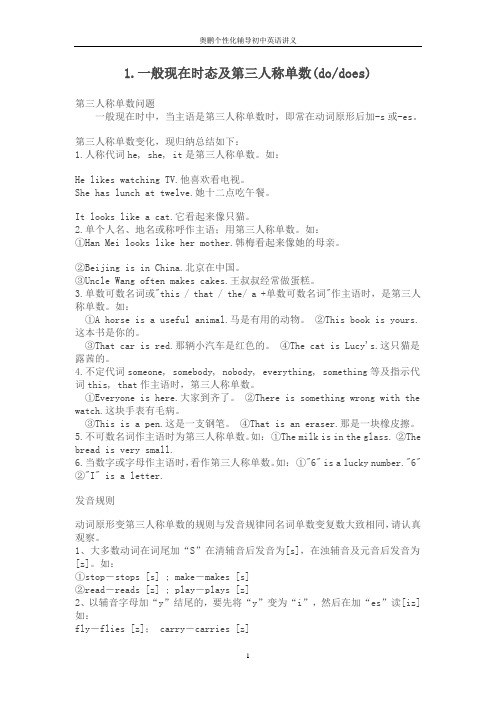
1.一般现在时态及第三人称单数(do/does)第三人称单数问题一般现在时中,当主语是第三人称单数时,即常在动词原形后加-s或-es。
第三人称单数变化,现归纳总结如下:1.人称代词he, she, it是第三人称单数。
如:He likes watching TV.他喜欢看电视。
She has lunch at twelve.她十二点吃午餐。
It looks like a cat.它看起来像只猫。
2.单个人名、地名或称呼作主语;用第三人称单数。
如:①Han Mei looks like her mother.韩梅看起来像她的母亲。
②Beijing is in China.北京在中国。
③Uncle Wang often makes cakes.王叔叔经常做蛋糕。
3.单数可数名词或"this / that / the/ a +单数可数名词"作主语时,是第三人称单数。
如:①A horse is a useful animal.马是有用的动物。
②This book is yours.这本书是你的。
③That car is red.那辆小汽车是红色的。
④The cat is Lu cy's.这只猫是露茜的。
4.不定代词someone, somebody, nobody, everything, something等及指示代词this, that作主语时,第三人称单数。
①Everyone is here.大家到齐了。
②There is something wrong with the watch.这块手表有毛病。
③This is a pen.这是一支钢笔。
④That is an eraser.那是一块橡皮擦。
5.不可数名词作主语时为第三人称单数。
如:①The milk is in the glass. ②The bread is very small.6.当数字或字母作主语时,看作第三人称单数。
英语八种时态讲解及练习

现在进行时
作谓语的动词用来表示动作(情况) 发生时间的各种形式称为时态。
1.概念:表示现阶段或说话时正在 进行的动作及行为。 2.时间状语:Now, at this time, days, look. listen等时间状语做标志。 3.基本结构:主语+be +doing +其 他 4.否定形式:主语+be +not +doing+ 其他 5.一般疑问句:把be动词放于句首。
现在分词的变法有
1)、一般在动词词尾加上-ing ,E.g. jump 2)、以不发音字母e结尾的动词,先 去e,再加-ing. E.g have write 3)、.以重读闭音节末尾只有一个辅 音字母结尾的词,它前面是单个元 音字母时要先将词尾的辅音字母双 写,再加上-ing. E.g. sit put 其句式 变换都在be上做文章。
10. I will go there when I _____(have, will have, has) time tomorrow. 11. He won’t come to the party unless he _____(be, will be, am, is, are) invited. 12. I’ll wait here until my mother ____(come, comes, will come) back. 13. Please return the book to the library as soon as you ______(finish, finishes, will finish) reading it. 14. Once you _____(see, sees, will see) him, you will never forget him.
初中英语语法一般现在时、将来时、过去时讲解及练习题
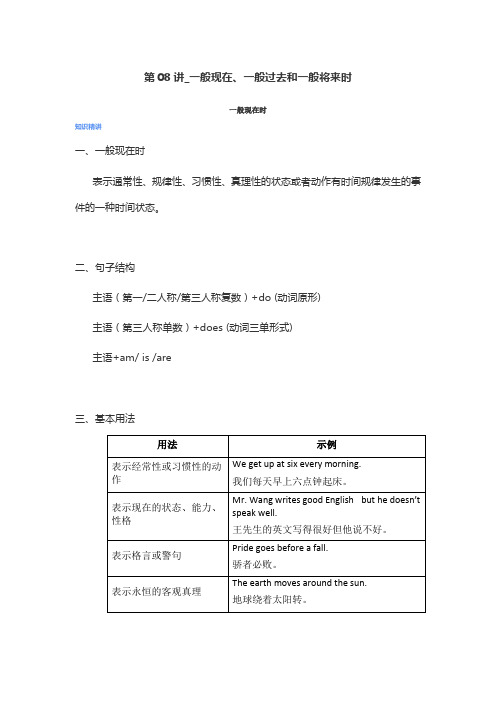
一般现在时知识精讲一、一般现在时表示通常性、规律性、习惯性、真理性的状态或者动作有时间规律发生的事件的一种时间状态。
二、句子结构主语(第一/二人称/第三人称复数)+do (动词原形)主语(第三人称单数)+does (动词三单形式)主语+am/ is /are三、基本用法四、时间状语1. 表示频率的副词: always, usually, often, sometimes, never, hardly, seldom…2. every/once+名词: every day/ week/ year, once a week/ month …3. 表示时间的短语: twice a day, on weekends, on Mondays…五、一般现在时动词三单的变化规律六、相关句式三点剖析一、考点:时态是英语学习中的核心内容之一,是英语学习的基础。
自然,时态考查是各种英语考试尤其是中考时的座上宾。
动作发生的时间决定时态,时态决定动词的形式,而考卷中的时态题通常没有给出明确的时间标志词,考试需领悟所提供的语境来做出判断。
只有推断出动作发出的正确时间,才可能正确答题,这就要求考生在熟练掌握时态结构、用法并牢记常用的时间状语的基础上,要充分利用上下文中隐含的信息来捕捉时间,找准答题的突破口。
二、重难点:一般现在时在考试中的重难点是:句子结构、基本用法、标志时间状语、动词三单的变化规则及相关句式的变化。
三、补充点:1. 表示按计划或安排好的,或将要发生的动作,可用一般现在时表将来。
但只限于start, begin, leave, go, come, arrive, return, take place等。
例:My train leaves at 7:00 this afternoon.我乘坐的火车将在今天下午7点离开。
2. 在复合句中,当主句是一般将来时,时间或条件状语从句的谓语动词只能用一般现在时来表示将来要发生的动作。
1、学生讲解习题(一般现在时一般过去时、一般将来时部分)

.概念:①;②;③。
(1)be型:句子的谓语动词只有be(am,is或are):a.肯定句中,只出现be,如:I am a student.我是一名学生。
b.否定句中,c.一般疑问句,(2)实义动词型:a.肯定句中,只出现实义动词,如:I get up in the morning.b.否定句中,every…, sometimes, at…, on Sunday2) 客观真理,客观存在,科学事实。
Shanghai lies in the east of China.3) 表示格言或警句中。
Pride goes before a fall. 骄者必败。
4) 现在时刻的状态、能力、性格、个性。
I don't want so much.现在一般时动词变化的规则是:1.如果主语是名词复数和第一人称I、we ,谓语动词不用做任何变化,2.主语是任何一个单数名词或者是第三人称单数,谓语动词要进行必要的变化。
特别提一点:不可数名词也算作单数处理。
3.谓语动词的变化规律是:(1) 在动词后加-s,-es read - reads,write - writes,say - says(2) 以s,x,ch,sh 结尾的词加-es teach - teaches,wash - washes,(3) 以辅音字母+y结尾的词变y为i再加-es try - tries,carry – carries(4) 特殊变化的词be (是) - am, is, are (I am she/he/it,名词单数都用is ,we, you, they, 名词复数都用are have (有) - have, has I, we, you, they, 名词复数都用have she/he/it is, 名词单数都用has)(5) 助动词,不论单复数、不论什么人称都没有变化,can, may, must, need, ought to 等。
一般将来时与一般现在时——讲解及练习

一般将来时一、一般将来时的定义一般将来时表示在现在看来即将要发生的动作或存在的状态。
常用时间副词tomorrow,soon或短语next year / week / month,in a few days, in the future, sometime 做状语.如:What will you do this afternoon. 你今天下午干什么?We will have a meeting tomorrow。
我们明天要开会。
He is going to study abroad next year。
明年他要出国学习。
二、一般将来时的基本用法及构成一般将来时的基本用法是表示单纯的将来事实,由“will / shall + 动词原形”构成:We shall have a lot of rain next month。
下个月将下很多雨。
I think she will pass the exam. 我想他考试会及格的。
三、表示将来时间的几种常见方法英语中除了“will /shall+动词原形”表示半来时态外,还可以有以下多种方法:(1)用“be going to+动词原形”表示。
主要表示打算和预测:We are not going to stay there long. 我们不准备在那里多待.(表打算)I'm afraid they're going to lose the game. 恐怕他们会赛输。
(表预测)Look, it’s going to rain。
瞧,要下雨了.(表预见)注:be going to 后接动词go和come时,通常直接改用其进行时态:Where is he going to go?/ Where is he going? 他打算到哪里去?(2)用“be to+动词原形”表示。
主要表示按计划或安排即将要发生的动作;有时也表示命令、禁止或可能性:He is to leave for Beijing tomorrow. 他决定明天去北京.Tell him he's not to be back late。
一般现在时,过去时,将来时 练习题解析

一般现在时、一般过去时、一般将来时——练习题答案解析一星题1.go解析:早上七点上班是一件经常做的事,所以是一般现在时。
We是复数,所以用go。
2.read解析:last night是昨晚,是一般过去时的标志词,read的过去式还是read。
3.Swept,didn’t解析:yesterday是一般过去时的标志词,所以用sweep的过去式,是swept,but表示转折,意味着我拖地板了但是妈妈没有,所以第二空填表示否定的,只有一个空,所以用助动词,didn’t。
4.Did,do,did解析:just now解释为刚才,是一般过去时标志词,所以是did,do,did。
5.Didn’t do解析:一般过去时否定句结构是didn’t do,原句中的动词过去式在加上didn’t之后变成原型,did就变为do。
6.Did,find,any解析:一般过去时一般疑问句的句子结构是Did+主语+do…?所以found变为find,some 变为any。
7.D解析:free是形容词,所以是be free,tomorrow是将来时标志词,所以前半句是Are you going to be free tomorrow?后半句把be going to换成了will。
所以是will be。
8.C解析:next week是将来时的标志词,there be句型表示“什么时候/什么地方有什么”,这里的有不需要再用have,所以是is going to be或者will be。
选择C。
两星题1.C解析:这里的Shall I表建议,如果是拒绝的回答就用No,please don’t。
2.C解析:in three days,在三天内,表将来,所以是C。
3.A解析:学好英语需要一段很长的时间,这是一个客观事实,所以用一般现在时。
所以选A。
4.Did,water;watered解析:this morning是已经过去了的今天早晨,所以是过去时,所以用Did,water,water 过去式直接加ed。
一般现在时-将来时和现在进行时的讲解与练习
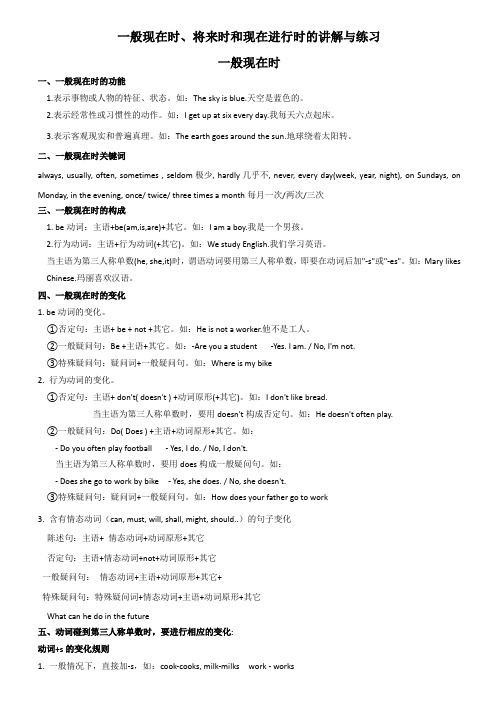
一般现在时、将来时和现在进行时的讲解与练习一般现在时一、一般现在时的功能1.表示事物或人物的特征、状态。
如:The sky is blue.天空是蓝色的。
2.表示经常性或习惯性的动作。
如:I get up at six every day.我每天六点起床。
3.表示客观现实和普遍真理。
如:The earth goes around the sun.地球绕着太阳转。
二、一般现在时关键词always, usually, often, sometimes , seldom极少, hardly几乎不, never, every day(week, year, night), on Sundays, on Monday, in the evening, once/ twice/ three times a month每月一次/两次/三次三、一般现在时的构成1. be动词:主语+be(am,is,are)+其它。
如:I am a boy.我是一个男孩。
2.行为动词:主语+行为动词(+其它)。
如:We study English.我们学习英语。
当主语为第三人称单数(he, she,it)时,谓语动词要用第三人称单数,即要在动词后加"-s"或"-es"。
如:Mary likes Chinese.玛丽喜欢汉语。
四、一般现在时的变化1. be动词的变化。
①否定句:主语+ be + not +其它。
如:He is not a worker.他不是工人。
②一般疑问句:Be +主语+其它。
如:-Are you a student -Yes. I am. / No, I'm not.③特殊疑问句:疑问词+一般疑问句。
如:Where is my bike2. 行为动词的变化。
①否定句:主语+ don't( doesn't ) +动词原形(+其它)。
如:I don't like bread.当主语为第三人称单数时,要用doesn't构成否定句。
一般现在时现在进行时一般将来时一般过去时知识点总结

一般现在时现在进行时一般将来时一般过去时知识点总结一般现在时、一般将来时、一般过去时、现在进行时知识总结一、一般现在时一般现在时表示经常性或惯性的动作,常与表示频度的时间状语连用,如often, usually, always, sometimes, never, seldom, every week/day/year/month...,once a week, on Sundays等。
动词用原形。
当主语为第三人称单数时(he, she, it,一个人名),动词变为三单形式。
Be动词肯定句主语+am/is/are+其它I am a boy.否定句一般疑问句Am/is/are+主语+其它Are you a boy? Yes, I am.No, I am not.Do+主语+动词原形+其它?Do you play basketball after school everyday? Yes, we do. / No, we don't.Does+主语+动词原形+其它。
Does he swim well ? Yes, he does. / No, XXX't.非凡疑问句疑问词(where/what/ when/who/why/how)+am/is/are+主语+别的Where are you?疑问词+do+主语+动词真相+别的?What do you do afterschool everyday?主语+am/is/arenot+别的I am not aXXX.第一人主语+动词原形(+主语+don't+行称I、第其它)。
We play动词原形(+其它)。
wedon’t为二人称basketball afteryou、XXX.playbasketball动复数after schoolXXX.词第三人主语+动词三单主语+称单数式(+别的)。
doesn’t+动词真相(+其XXX.它)。
XXX’tswim well.疑问词+does+主语+动词原形+其它。
英语语法一般现在时和一般将来时

1.一般现在时的用法1)经常性或习惯性的动作,常与表示频腮度的时间状语连用。
时间状语:every…, sometimes, at…, on Sunday。
例如:I leave home for school at 7 every morning. 每天早上我七点离开家。
2)客观真理,客观存在,科学事实。
例如:The earth moves around the sun. 地球绕太阳转动。
Shanghai lies in the east of China. 上海位于中国东部。
3)表示格言或警句。
例如:Pride goes before a fall. 骄者必败。
注意:此用法如果出现在宾语从句中,即使主句是过去时,从句谓语也要用一般现在时。
例:Columbus proved that the earth is round. 哥伦布证实了地球是圆的。
4)现在时刻的状态、能力、性格、个性。
例如:I don't want so much. 我不要那么多。
Ann writes good English but does not speak well. 安英语写得不错,讲的可不行。
比较:Now I put the sugar in the cup. 把糖放入杯子。
I am doing my homework now. 我正在做功课。
第一句用一般现在时,用于操作演示或指导说明的示范性动作,表示言行的瞬间动作。
第二句中的now是进行时的标志,表示正在进行的动作的客观状况,所以后句用一般现在时。
2. 一般过去时的用法1)在确定的过去时间里所发生的动作或存在的状态。
例如:时间状语有:yesterday, last week, an hour ago, the other day, in 1982等。
例如:Where did you go just now? 刚才你上哪儿去了?2)表示在过去一段时间内,经常性或习惯性的动作。
PEP六上语法专题:一般现在时、将来时、情态动词

填空(3.5分) 1. 我打算明天和家人去野炊。
I__a_m__ __g_o_i_n_g ___t_o__ have a picnic with my family. I __w_i_ll_have a picnic with my friends. 2. 下个星期一你打算去干嘛? 我想去打篮球。 What _a_r_e_ __y_o_u_ __g_o_in_g_ ___t_o_ __d_o__ next Monday? I ___a_m_ __g_o_in_g_ ___t_o__ play basketball.
— Yes, she does. / No, she doesn't. 特殊疑问句:特殊疑问词+一般疑问句? 如:How does your mother go to work?
动词+s的变化规则: 1.一般情况下,直接加-s:
如:cook-cooks milk-milks work-works 2.以s. x. sh. ch. o结尾,加-es:
stay __s_t_a_y_s_
make_m__a_k_e_s
look __lo__o_k_s__ have_h__a_s_
pass__p_a_s_s_es_
carry _c_a_r_r_ie_s come__c_o_m_e_s_
watch_w__a_tc_h_e_s
plant_p__la_n_t_s_ fly __fl_ie_s__
三、一般现在时的变化 1. be动词的变化:
一般现在时、一般过去时、一般将来时

教学内容知识点一:一般现在时【知识梳理】(1)一般现在时的基本结构和变化1.一般现在时的结构①be动词:主语+be(am, is, are)+其它。
e.g. I am a boy.我是一个男孩。
②行为动词:主语+行为动词(+其它)。
一般现在时主要用动词的原形表示,如果主语是第三人称单数,则在动词原形后加"-s"或"-es"e.g. He gets up early in the morning.2.否定句和疑问句的变化①be动词的变化:A.否定句:主语+ be + not +其它。
He is not a worker.他不是工人。
B. 一般疑问句:Be +主语+其它。
---Are you a student? ---Yes. I am. / No, I'm not.C. 特殊疑问句:疑问词+一般疑问句。
Where is my bike?②行为动词的变化:A.否定句:主语+ don't( doesn't ) +动词原形(+其它)。
I don't like bread. / He doesn't like bread.B. 一般疑问句:Do ( Does ) +主语+动词原形+其它。
---Do you often play football? --- Yes, I do. / No, I don't.--- Does she go to work by bike? --- Yes, she does. / No, she doesn't.C. 特殊疑问句:疑问词+一般疑问句。
How does your father go to work?(注意回顾动词第三人称单数形式变化规则)一般情况下在词尾加s help→helps, clean→cleans, play→plays, wear→wears, give→gives; 以s, x, ch, sh结尾的动词在词尾加es dress→dresses, fix→fixes, watch→watches, finish→finishes;以“辅音字母加y”结尾的动词,把y变为i,再study→studies, carry→carries, fly→flies )(2)一般现在时的用法•1.表示经常性或习惯性的动作或行为。
(完整word版)一般将来时态讲解及练习和答案

1、概述一般将来时表示将来某个时间要发生的动作或存在的状态,常与表示将来的时间状语连用,如tomorrow,next week,next year等。
Why don’t you put the meat in the fridge? It will stay fresh for several days.为什么不把肉放在冰箱里?它可以保鲜好几天。
—You’ve left the light on。
你忘了关灯了。
- Oh , so I have。
I'll go and turn it off。
噢,那我马上去关.2、构成一般将来时由“助动词will/shall+动词原形”构成。
will用于第二、三人称,shall第一人称。
在口语中,will在名词或代词后常缩写为’ll,will not简缩为won’t[wount]。
但在美国英语中,各种人称皆可用will。
He will help his sister with her lessons。
他将帮助他妹妹做功课.We won’t be free this afternoon.今天下午我们没空。
3、一般将来时的用法(1)表示未来的动作或存在状态,常与表示将来的时间状语连用,如tomorrow, next Sunday, soon,in a month, in the future等。
We shall leave for London next Monday.我们将在下周一去伦敦。
He will come to see you the day after tomorrow.后天他要来看你。
You will be 20 next year。
明年你就二十了。
(2)表示将来反复发生的动作或习惯性动作We shall come and work in this factory every year.我们将每年来这工厂参加劳动。
The students will have five English classes per week this term.本学期学生每周将要上五节英语课。
- 1、下载文档前请自行甄别文档内容的完整性,平台不提供额外的编辑、内容补充、找答案等附加服务。
- 2、"仅部分预览"的文档,不可在线预览部分如存在完整性等问题,可反馈申请退款(可完整预览的文档不适用该条件!)。
- 3、如文档侵犯您的权益,请联系客服反馈,我们会尽快为您处理(人工客服工作时间:9:00-18:30)。
一般将来时一、一般将来时的定义一般将来时表示在现在看来即将要发生的动作或存在的状态。
常用时间副词tomorrow, soon或短语next year / week / month, in a few days, in the future, sometime 做状语。
如:What will you do this afternoon. 你今天下午干什么?We will have a meeting tomorrow. 我们明天要开会。
He is going to study abroad next year. 明年他要出国学习。
二、一般将来时的基本用法及构成一般将来时的基本用法是表示单纯的将来事实,由“will / shall + 动词原形”构成:We shall have a lot of rain next month. 下个月将下很多雨。
I think she will pass the exam. 我想他考试会及格的。
三、表示将来时间的几种常见方法英语中除了“will /shall+动词原形”表示半来时态外,还可以有以下多种方法:(1)用“be going to+动词原形”表示。
主要表示打算和预测:We are not going to stay there long. 我们不准备在那里多待。
(表打算)I’m afraid they’re going to lose the game.恐怕他们会赛输。
(表预测)Look, it’s going to rain.瞧,要下雨了。
(表预见)注:be going to 后接动词go和come时,通常直接改用其进行时态:Where is he going to go? / Where is he going? 他打算到哪里去?(2)用“be to+动词原形”表示。
主要表示按计划或安排即将要发生的动作;有时也表示命令、禁止或可能性:He is to leave for Beijing tomorrow. 他决定明天去北京。
Tell him he’s not to be back late.告诉他不准迟回。
(3)用“be about to+动词原形”表示。
主要表示即将要发生的事:He is about to leave. 他即将要离开。
Sit down, everyone. The film is about to start. 大家坐好,电影马上就要开发始了。
注:该结构通常不与具体的时间状语连用:误:He is about to leave soon [tomorrow].另外,该结构在美国英语中还可表示“打算”(主要用于否定句):I’m not about to lend him any more money.我不打算再借给他任何钱。
(4)用“be due to+动词原形”表示。
主要表示按计划或时间表将要发生某事:He is due to leave very soon. 他很快就要离开。
His book is due to be published in October. 他的书计划10月份出版。
(5)用“现在进行时”(即be+现在分词)表示。
主要表示按计划或安排要发生的事:The students are leaving on Sunday. 学生们星期日出发。
We’re having a party next week.我们下星期将开一个晚会。
注:该用法有时表示即将发生的动作:I’m leaving.我走了。
(6)用“一般现在时”表示。
表示按规定或时间表预计要发生的事:The train leaves at 7:25 this evening. 火车今晚7:25分开。
Tomorrow is Wednesday. 明天是星期三。
We have a holiday tomorrow. 我们明天放假。
注:在表示时间、条件等的状语从句以及某些名词性从句、定语从句等中,也用一般现在时表示将来意义,参见“时态详解:一般现在时”的有关用法。
四、三种将来时间表示法的比较(1) “will / shall+动词原形”与“be going to+动词原形”两者均可表示将来时间和意图,两者有时可换用:I think it’ll rain this evening. / I think it’s going to rain this evening.我想今晚会下雨。
I won’t tell you about it. / I’m not going to tell you about it.我不会把这事告诉你的。
但有时有差别:①若是强调某个意图是经过事先考虑好的,则通常要用be going to;若是表示某个意图没有经过事先考虑,而是在说话的当时才临时想到的,则通常用will。
比较:"Ann is in hospital." "Oh, really? I didn’t know. I’ll go and visit her." “安住院了。
”“啊,真的吗?我还不知道。
我要去看看她。
” (临时想法,不能用be going to)"Ann is in hospital." "Yes, I know. I’m going to visit her tomorrow. “安住院了。
”“我知道,我打算明天去看看她。
” (事先考虑的意图,不能用will)②若是有迹象表明要发生某事,通常只用be going to,不用will:Look at those black clouds. It’s going to rain.看那些乌云,要下雨了。
③带有时间或条件状语从句的主句通常不宜用be going to,而用will:When he comes back, I will tell him the news. 他回来时我就告诉他这个消息。
If he comes back, I will tell him the news. 他若回来我就告诉他这个消息。
(2)“be going to+动词原形”与“现在进行时”① be going to主要表示主观想法或意图,而现在进行进表示将来则主要已经强调作出的安排。
比较:I’m going to wash the car if I have time.若有时间我想洗洗车。
(主观想法)I’m picking you up at 6; don’t forget.我6点钟来接你,不要忘了。
(已作出的安排)②但是当要表示主观无法控制的预测时,通常要用be going to,不能用现在进行时态:It’s going to snow before long. 不久会下雪。
Things are going to get better soon. 情况很快就会好起来。
③当表示坚持要(不要)某人做某事时,两者均可用:She’s taking [going to take] that medicine whether he likes it or not.不管她喜欢不喜欢,她都得吃那药。
You’re not wearing [going to wear] that skirt to school.你不可以穿那条裙子去上学。
(3) “be going to+动词原形”与“be to+动词原形”的区别两者均可表示按计划或安排要发生的动作,有时可互换(但be to比be going to正式):Where are we going to stay tonight? 我们今晚住哪里?I’m (going) to play tennis this afternoon.我打算今天下午打网球。
另外,be going to 还可表示预测,即根据已有迹象预测将要发生的动作,此时不能用be to:Look, it’s g oing to rain. 看,要下雨了。
五、典型一般将来时考题详解【例1】Turn on the television or open a magazine and you __________ advertisements showing happy familiesA. will often seeB. often seeC. are often seeingD. have often seen分析:A。
这是“祈使句+and +陈述句”句型,祈使句相当于一个条件状语从句,and后的陈述句的谓语用一般将来时,这是一个较为固定的句型。
【例2】He was hoping to go abroad but his parents __________that they won’t support him unless he can borrow money from the bank.A. were decidingB. have decidedC. decidedD. will decide分析:B。
因宾语从句中的时态是一般将来时,主句中的谓语动词不可能是过去时态,排除选项A和D; 由语境判断,不是“将要决定”,而是“现在已经决定”,所以排除D,而选B。
【例3】—How can I apply for an online course?—Just fill out this form and we __________ what we can do four you.A. seeB. are seeingC. have seenD. will see分析:D。
表示将要发生的情况,自然是用一般将来时。
【例4】If their marketing plans succeed, they _________ their sales by 20 percent.A. will increaseB. have been increasingC. have increasedD. would be increasing分析:A。
由于if条件从句用的是一般现在时,所以其相应的主句宜用一般将来时。
【例5】Population experts predict that most people _________ in cities in the near future.A. liveB. would liveC. will liveD. have lived分析:C。
根据句中的in the near future可知要用一般将来时。
【例6】When I talked with my grandma on the phone, she sounded weak, but by the time we ________ up, her voice had been full of life.A.were hangingB.had hungC.hungD.would hang分析:C。
